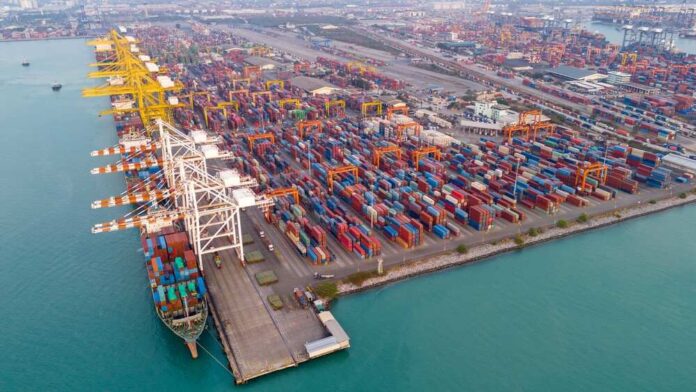
Shortage Looms as Dockworkers’ Strike Threatens to Choke Off Half of U.S. Imports
The first major dockworkers’ strike in nearly 50 years has paralyzed East and Gulf Coast ports, potentially leading to nationwide shortages of bananas and other imported goods. This industrial action, involving 45,000 workers, is already causing ripples through the U.S. economy, with experts warning of impending price hikes and scarcity of essential products. As negotiations between the International Longshoremen’s Association and port operators remain deadlocked, the impact on American consumers and businesses is set to intensify, potentially lasting into the holiday season.
A Banana Republic in the Making?
Well, folks, it looks like we’re one step closer to becoming a genuine banana republic – minus the bananas. The irony is as rich as a perfectly ripe plantain. Here we are, the mightiest economy on Earth, and we’re about to run out of one of the most basic fruits in our grocery stores. Why? Because a bunch of dockworkers decided they needed a vacation right when our supply chains are already more tangled than a toddler’s shoelaces.
Let’s be clear: this isn’t just about bananas. We’re talking about a potential chokehold on half of our nation’s imports. That’s right, half. Suddenly, that “Made in America” label is looking pretty darn good, isn’t it? But for those of us who enjoy a little variety in our lives – say, a coffee that doesn’t taste like it was brewed in a gas station bathroom – we might be in for a rude awakening.
From @Breakingviews: A strike by US dockworkers threatens to cost the economy $5 billion daily. With just over a month to go before the election, Democrats are wary of angering their union allies. But shortages and price spikes aren’t an option either, explains @rubinations pic.twitter.com/CdZlu3TpOY
— Reuters (@Reuters) October 1, 2024
The Domino Effect: From Ports to Pantries
Now, let’s break down this clusterfudge for those who haven’t been paying attention. We’ve got 45,000 dockworkers throwing a hissy fit from Maine to Texas. The last time this happened, disco was still a thing and Jimmy Carter was wondering why his peanut farm wasn’t doing so hot. Fast forward to 2024, and we’re about to get a crash course in what happens when the flow of goods into the country gets cut off faster than a politician’s mic at a town hall meeting.
“First and foremost, we can expect delays to market. And those delays depend on really what the commodities are and priorities at the ports and how quickly things move,” said Mark Baxa, president of the Council of Supply Chain Management Professionals.
Oh, you don’t say, Mark? I’m sure the average Joe trying to buy a bunch of bananas for his kid’s lunchbox is thrilled to hear about “market delays” and “port priorities.” Here’s a priority for you: How about keeping the shelves stocked so we don’t have to explain to our children why they’re eating ketchup sandwiches instead of PB&J?
The Presidential Shrug
And where’s our fearless leader in all this? Well, President Biden, in his infinite wisdom, has decided to sit this one out. When asked about using the Taft-Hartley Act to intervene, he simply said, “Because it’s collective bargaining, I don’t believe in Taft-Hartley.” Well, isn’t that just peachy? I’m sure the collective bargaining of 45,000 workers is way more important than the collective panic of 330 million Americans wondering if they’ll be able to buy imported goods without taking out a second mortgage.
“Because it’s collective bargaining, I don’t believe in Taft-Hartley,” Biden said.
But hey, who needs presidential intervention when we’ve got the sage advice of experts like Andrew Coggins from Pace University? He’s predicting shortages within two to three weeks. Gee, thanks, Professor. I’m sure that’s very comforting to the small business owners and families who are already stretched thin by inflation and now have to worry about whether they’ll be able to stock their shelves or feed their kids.
The Ripple Effect: Beyond Bananas
And let’s not forget about the farmers and exporters who rely on these ports. We’re talking about a potential $318 million hit to agricultural exports in just one week. That’s a lot of soybeans and poultry that won’t be making it to dinner tables around the world. But I’m sure our hardworking farmers will be thrilled to know their produce is rotting on the docks in the name of “collective bargaining.”
“Within two to three weeks you should start seeing shortages,” Andrew Coggins, a clinical professor of management and management science at Pace University’s Lubin School of Business, told CBS MoneyWatch.
But wait, there’s more! It’s not just food we’re talking about. Automobiles, electronics, even your favorite imported whiskey could be affected. So, if you were planning on drowning your sorrows over the banana shortage with a nice glass of scotch, you might want to think again. At this rate, we’ll be lucky if we can afford a domestic beer to cry into.
The Bottom Line: A Bunch of Trouble
Look, folks, I’m all for fair wages and safe working conditions. But when your labor dispute threatens to bring a superpower to its knees over a bunch of bananas, maybe it’s time to rethink your strategy. As for the rest of us, I guess we’ll just have to get creative with our fruit choices and pray that common sense prevails before we’re forced to trade our iPhones for a crate of apples on the black market.
In the meantime, maybe we should all start practicing our best banana-less smoothie recipes. Who knows? By the time this is over, kale might actually start tasting good. But let’s not go bananas just yet – after all, in America, even our crises come with a side of absurdity. Stay tuned, folks. This bunch of trouble is just getting ripe.














